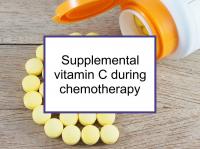Vitamin C (ascorbic acid) is vital to human health. DNA damage resulting from deficiencies in micronutrients such as vitamin C is thought to be a major cause of cancer. Relatively high intakes of dietary vitamin C (i.e., from consuming food) have been found to be associated with somewhat lower risks of various types of cancer.
Vitamin C also has been shown to have neuroprotective and cardioprotective properties. This has led some practitioners to use high doses of supplemental vitamin C to treat breast cancer and/or attempt to reduce the toxic side effects of conventional chemotherapy. Now a new analysis of previous studies has concluded that there is no high-quality evidence that vitamin C supplementation enhances the antitumor effects of chemotherapy or reduces its toxic side effects.
The case for antioxidant supplementation is based, in part, on the observation that cancer patients tend to have low blood levels of antioxidants compared to healthy individuals. These low levels suggests that such patients have exhausted the antioxidant defenses of the body and are vulnerable to oxidative damage that could further promote cancer.
However, the available evidence suggests that antioxidant supplementation can also promote cancer in some cases. For example, several studies have reported associations between beta-carotene, retinol (vitamin A), and lutein supplementation and increased risk of lung cancer. Apparently, some types of cancer cells are able to use concentrated antioxidants to support growth or resist cell death.
The evidence concerning the influence of vitamin C supplementation on breast cancer prognosis is inconclusive. Large studies that have examined typical levels of vitamin C supplementation (included those found in multivitamins) have produced mixed results. Supplemental vitamin C intake has been found both to be weakly associated with improved survival and to have no impact on prognosis. No study has demonstrated a treatment benefit for intravenous vitamin C and researchers have for the most part abandoned the study of high doses of vitamin C as a potential cancer cure.
It is important for breast cancer patients to avoid taking supplements that will lessen the cytotoxic impact of treatment on breast cancer cells. While various antioxidants found in fruits, vegetables and other foods have been shown to help protect against breast cancer development and metastasis, some of the same micronutrients in concentrated form might enable breast cancer cells to survive such treatment.
Vitamin C supplements should not be taken during tamoxifen treatment since it has been shown to protect breast cancer cells from tamoxifen. Vitamin C also interferes with the treatment effects of Velcade (bortezomib), which is sometimes used to treat breast cancer. Recently, it was reported that glioma (a type of brain tumor) progression was faster in tumor-bearing mice treated with radiation and daily vitamin C than in those treated with radiation alone. While brain cancer is in many ways not comparable to breast cancer, the possibility that vitamin C could also protect breast cancer cells against radiotherapy is worth noting.
Best food sources of vitamin C
Breast cancer patients can obtain vitamin C from a wide variety of fruits and vegetables. Below are foods with high vitamin C content that also have been found to associated with reduce breast cancer risk:
Other foods with high levels of vitamin C include cantaloupes, grapefruit, kiwifruit, lemons, oranges, papaya, pineapple and strawberries.
Latest research notes lack of high-quality vitamin C evidence
The analysis referenced at the beginning of this news story was designed to evaluate the hypothesis that vitamin C synergizes the anticancer effects of chemotherapy and reduces its toxic side effects. To conduct the study, the authors searched for applicable randomized and observational studies in the Medline (from 1946), EMBASE (from 1947), and Cochrane central register (from 1993) databases through March 2014. The authors evaluated 61 articles, of which 34 were included: five randomized controlled trials (combined sample size n = 322), 12 phase I/II trials (n = 287), six observational studies (n = 7,599), and 11 case reports (n = 267).
The authors were unable to combine the data from the trials for analysis because the study designs were too dissimilar (high heterogeneity). The same held true of the observational studies. Therefore, no meta-analyses of combined data were performed. None of the randomized controlled trials found statistically significant improvements in overall survival or progression-free survival. Nor did any of the trials report reduced toxicity for vitamin C compared to controls who did not receive vitamin C. There was some evidence of antitumor effects of vitamin C, but this was limited to case reports and observational and uncontrolled studies. The authors conclude that high-quality evidence to suggest that vitamin C supplementation in cancer patients either enhances the antitumor effects of chemotherapy or reduces its toxicity is lacking. Given the high financial cost and time-consuming nature of this treatment, high-quality placebo-controlled trials are needed, according to the authors.
See our article on vitamin C for more information.
